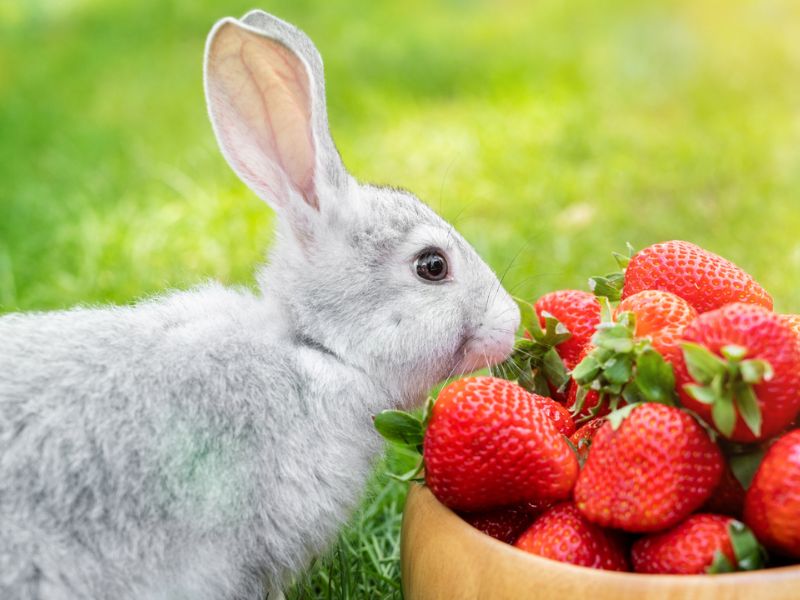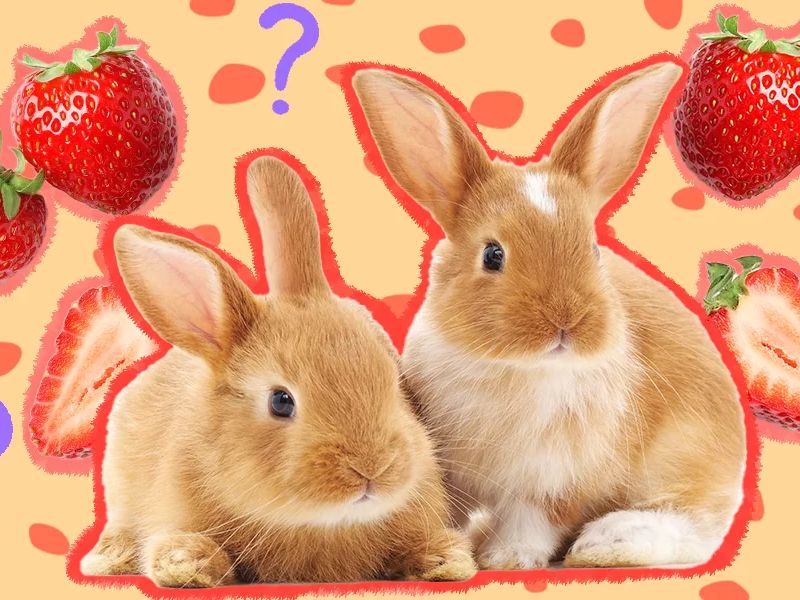Can rabbits eat strawberries? If you’re a bunny parent, you’ve probably wondered whether this juicy, red fruit is a safe treat or a hidden danger. While rabbits can enjoy certain fruits in moderation, not all human snacks are rabbit-approved. In this article, we’ll break down whether strawberries are safe for your furry friend, how much is okay to offer, and what signs to watch for after feeding. Let’s make sure your rabbit stays both happy and healthy—one berry at a time
In this article, Pawly Daily will explore everything you need to know about feeding strawberries to rabbits, including the nutritional benefits, potential risks, proper serving sizes, and expert guidelines to ensure your rabbit stays healthy and happy.
Are Strawberries Safe for Rabbits?
Yes, strawberries are safe for rabbits to eat, but they should be offered sparingly. Strawberries are not toxic and can provide some nutritional value. However, due to their high natural sugar content, they should not be a staple in a rabbit’s diet.
Rabbits are herbivores with sensitive digestive systems that are adapted to a diet rich in hay, leafy greens, and a limited amount of fresh fruits and vegetables. Sugary fruits like strawberries can be enjoyed as treats, but only in small quantities.
It’s important to remember that just because something is safe doesn’t mean it’s always healthy in large amounts. Moderation is key when offering strawberries to your bunny.
Nutritional Benefits of Strawberries for Rabbits
Strawberries, like many fruits, contain a mix of vitamins, minerals, and antioxidants that can be beneficial for your rabbit’s overall well-being when given in controlled amounts.
1. High Fiber Content
Fiber is essential for a rabbit’s digestive health. While strawberries aren’t as fiber-rich as hay, they still provide some dietary fiber that can help support gut function. However, the fiber content in strawberries is low compared to leafy greens, so they should not replace your rabbit’s primary food sources.
2. Rich in Vitamin C
Strawberries contain a decent amount of vitamin C, an antioxidant that helps support the immune system. While rabbits can produce their own vitamin C, the additional intake from occasional strawberry snacks can provide extra support.
3. Antioxidants
Strawberries are known for their antioxidant content, including anthocyanins, which can help combat oxidative stress in the body. These compounds may have anti-inflammatory effects and support overall health.
4. Low Calcium
High calcium levels in a rabbit’s diet can lead to kidney stones or sludge. Strawberries have a low calcium content, making them a safer fruit choice compared to others with higher calcium levels.
Potential Risks of Feeding Strawberries to Rabbits
Despite their benefits, strawberries come with some risks if not fed appropriately.
1. High Sugar Content
Strawberries are naturally sweet, and while this makes them appealing to rabbits, it also means they can contribute to weight gain, dental issues, and digestive disturbances if overfed. Rabbits are prone to obesity, especially if they consume too many sugary foods.
2. Digestive Issues
Feeding too many strawberries can cause gastrointestinal upset, including soft stools or diarrhea. In severe cases, it may lead to gastrointestinal stasis (GI stasis), a serious and potentially fatal condition where the rabbit’s digestive system slows down or stops completely.
3. Pesticides and Chemicals
Strawberries are often grown using pesticides. Residue from these chemicals can be harmful to your rabbit. Always choose organic strawberries when possible and wash them thoroughly before feeding.
4. Leaves and Stems
While strawberry leaves are not toxic, they contain oxalates, which in large quantities can contribute to kidney problems. It’s best to remove stems and leaves before feeding strawberries to your rabbit.

Guidelines for Feeding Strawberries to Rabbits
Feeding strawberries to your rabbit can be a safe and enjoyable experience if done the right way. Here are some best practices to follow:
1. Serving Size
A good rule of thumb is to feed 1 to 2 teaspoons of chopped strawberries per 2 pounds (around 1 kg) of your rabbit’s body weight. For a medium-sized rabbit (around 5–6 pounds), this equates to about 1–3 small slices.
2. Feeding Frequency
Strawberries should be an occasional treat. Aim to offer them once or twice a week at most, and never on consecutive days. Treats, including all fruits, should make up no more than 5% of your rabbit’s total diet.
3. Preparation Tips
- Wash thoroughly: Always rinse strawberries under running water to remove dirt, pesticides, and chemicals.
- Remove stems and leaves: These parts contain oxalates and are best avoided.
- Cut into small pieces: This makes it easier for your rabbit to chew and reduces the risk of choking.
- Introduce gradually: If your rabbit has never eaten strawberries before, start with a tiny piece and observe for any signs of digestive upset or allergic reaction.
4. Monitor Reactions
Every rabbit is different. After introducing strawberries, watch for symptoms such as diarrhea, bloating, or changes in appetite. If any of these occur, stop feeding strawberries and consult a veterinarian.
Special Considerations
While strawberries are generally safe for most rabbits, there are a few exceptions and special cases to keep in mind.
1. Baby Rabbits
Strawberries should not be fed to rabbits younger than 12 weeks old. At this stage, their digestive systems are still developing, and they should stick to a diet of mother’s milk, hay, and age-appropriate greens.
2. Rabbits with Health Issues
Rabbits with underlying health conditions—such as obesity, dental problems, diabetes, or gastrointestinal sensitivity—should avoid sugary fruits altogether. If your rabbit has any of these conditions, consult a vet before introducing new foods.
3. Mixing with Other Treats
Don’t offer strawberries in combination with other fruits on the same day. This can overwhelm the digestive system with sugar and increase the risk of GI issues.
So, can rabbits eat strawberries? Absolutely—but with care and moderation.
Strawberries can be a delightful, occasional treat that offers vitamins and antioxidants, but they should never replace the essential components of your rabbit’s diet: high-quality hay, fresh leafy greens, and clean water.
By following the right feeding guidelines, washing fruit thoroughly, and observing your rabbit’s reaction, you can safely include strawberries as part of your bunny’s treat rotation. Always remember: when in doubt, consult a veterinarian to ensure you’re meeting your rabbit’s specific nutritional needs.
A happy rabbit is a healthy rabbit—and a healthy rabbit enjoys the occasional strawberry with a twitch of joy!

